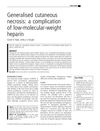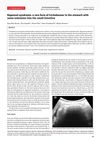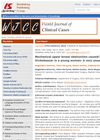 1 citations,
May 2023 in “European Journal of Human Genetics”
1 citations,
May 2023 in “European Journal of Human Genetics” Rare ULBP3 gene changes may raise the risk of Alopecia areata, a certain FAS gene deletion could cause a dysfunctional protein in an immune disorder, and having one copy of a specific genetic deletion is okay, but two copies cause sickle cell disease.
1 citations,
August 2022 in “Frontiers in Physiology” Finasteride may help treat kidney disease caused by a high-fat diet by reducing harmful toxins and improving gut bacteria.
1 citations,
August 2021 in “International Journal of General Medicine” Severe and early hair loss may indicate a higher risk of heart disease.
 1 citations,
May 2021 in “Mayo Clinic Proceedings”
1 citations,
May 2021 in “Mayo Clinic Proceedings” A 69-year-old man with sinus infection and fainting spells was diagnosed with a rare kidney disease, treated with steroids and a specific drug, which improved his condition.
 1 citations,
November 2020 in “Asian Journal of Pharmaceutical and Clinical Research”
1 citations,
November 2020 in “Asian Journal of Pharmaceutical and Clinical Research” Nanoparticles may improve treatment for lung disease by targeting cells better and reducing side effects.
June 2024 in “Regenerative Therapy” Exosomes from stem cells may help rejuvenate skin and regrow hair, but more research is needed.
 May 2024 in “Scientific African”
May 2024 in “Scientific African” Three natural compounds from Ghanaian plants may help treat BPH and alopecia.

Zinc levels and lymphocyte counts might be important in heart disease development.
 March 2024 in “Dermatologic therapy”
March 2024 in “Dermatologic therapy” Fire Needle Therapy may help bring back skin color in vitiligo by affecting cell growth signals.
 August 2023 in “Molecules and Cells”
August 2023 in “Molecules and Cells” Hair can regrow after significant damage through a process similar to how it forms before birth, involving stem cells and various cell types and signals. This could be a new way to prevent scarring and promote hair growth.

Umbilical cord blood is a valuable source of stem cells for medical treatments, but its use is less common than other transplants, and there are ethical issues to consider.
 June 2023 in “Frontiers in Bioengineering and Biotechnology”
June 2023 in “Frontiers in Bioengineering and Biotechnology” The conclusion is that accurately replicating the complexity of the extracellular matrix in the lab is crucial for creating realistic human tissue models.
 April 2023 in “American Journal of Transplantation”
April 2023 in “American Journal of Transplantation” Hormone replacement therapy may lower the risk of severe COVID-19 outcomes in non-immunosuppressed people and male organ transplant recipients.
 April 2023 in “Dentistry”
April 2023 in “Dentistry” Baby teeth stem cells can potentially grow organs and treat diseases.
 January 2023 in “International Journal of Molecular Sciences”
January 2023 in “International Journal of Molecular Sciences” Maxillariinae orchids contain 62 compounds with potential health benefits, including treating skin conditions and diseases like cancer and diabetes.
 August 2022 in “IARS international research journal”
August 2022 in “IARS international research journal” The document concludes that drug repurposing, which is reusing known medicines for new illnesses, can provide faster, cheaper treatment options for various serious diseases, including cancer, COVID-19, and rare diseases.
 August 2022 in “International Journal of Health Sciences (IJHS)”
August 2022 in “International Journal of Health Sciences (IJHS)” Low levels of zinc, ferritin, and vitamin B12 are linked to severe hair loss in pregnant women during their last two trimesters.
 January 2008 in “US endocrinology”
January 2008 in “US endocrinology” Mutations in the glucocorticoid receptor gene cause reduced sensitivity to glucocorticoids and may lead to poor response to treatment.
June 2022 in “Mayo Clinic Proceedings” The man was diagnosed with stage III multiple myeloma and treated to improve kidney function.
 728 citations,
August 1996 in “The New England Journal of Medicine”
728 citations,
August 1996 in “The New England Journal of Medicine” Terazosin and finasteride effectively treat BPH, but combining them adds no extra benefit.
 11 citations,
September 2005 in “International Wound Journal”
11 citations,
September 2005 in “International Wound Journal” A woman developed severe skin damage after using a blood thinner called low-molecular-weight heparin.
 22 citations,
June 2007 in “Radiologia Medica”
22 citations,
June 2007 in “Radiologia Medica” Testicular microlithiasis may increase the risk of testicular cancer and patients with it should be closely monitored.
 6 citations,
January 2018 in “Acta dermatovenerologica Alpina, Pannonica et Adriatica (Tiskana izd.)”
6 citations,
January 2018 in “Acta dermatovenerologica Alpina, Pannonica et Adriatica (Tiskana izd.)” An 8-year-old girl with Rapunzel syndrome had a hairball removed from her stomach and intestines and recovered well after surgery.
 December 2023 in “Urogenital tract infection”
December 2023 in “Urogenital tract infection” Seminal bacteria can lower sperm quality in subfertile men.
 August 2015 in “Dermatología Argentina”
August 2015 in “Dermatología Argentina” Frontal fibrosing alopecia causes hairline recession and eyebrow loss in postmenopausal women.
 18 citations,
March 2009 in “Medical Hypotheses”
18 citations,
March 2009 in “Medical Hypotheses” The document suggests that blocking sweat glands with antiperspirants might allow skin-generated hormones to be absorbed, possibly increasing breast and prostate cancer risk.
 February 2024 in “World journal of clinical cases”
February 2024 in “World journal of clinical cases” A young woman had surgery to remove a large hairball that blocked her intestines and then got psychiatric help.
 December 2023 in “Curēus”
December 2023 in “Curēus” A woman with lupus had rare severe symptoms but improved with treatment.
 September 2022 in “Archivio italiano di urologia, andrologia”
September 2022 in “Archivio italiano di urologia, andrologia” Prostate surgery is often effective long-term, but some patients may need more treatment or another surgery, especially if they had prostatitis before.
 October 2006 in “Aging Health”
October 2006 in “Aging Health” Dutasteride effectively treats benign prostatic obstruction, improves urinary flow, reduces prostate size, and may prevent prostate cancer, but can cause sexual side effects.

























